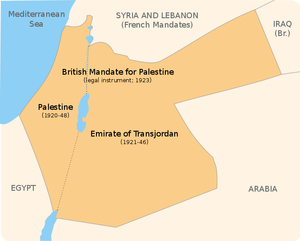
Yishuv refers to the Jewish community in Palestine. The British Mandate period was from 1922 to 1948.
This post continues from the same reference (Nur Masalha’s Expulsion of the Palestinians) as in my previous post, and looks at a Palestinian historian’s discussion of the fate of the Palestinian people as planned by the Zionist movement from “the beginning”. Some readers may accuse me of stirring up hatred against the Jews by posting this sort of research. I deny any such charge. The ill-feeling and tensions that have resulted from the events and attitudes described in this and in the previous post don’t have to be “stirred up”. But many people in the West certainly do need to be “waked up” to the other side of the story. Obscenely, one is often accused of “antisemitism” for even daring to raise the Palestinian voice, or even any voice mildly critical of Zionist or Israeli state policies.
The world, and Palestinians and Israelis in particular, are living today with the legacy of the past. Justice, the precondition for peace, can only emerge after all the facts — from both parties — are laid out for all to see. Hiding one side’s story under the rocks of the desert will never extinguish injustice and hatred. We have lauded Truth and Reconciliation Commissions and National Apologies in cases of other ethnic horror stories. They could never have happened unless both sides — especially that of the defeated — were fully aired.
The General Approach toward the Palestinians in the Mandatory Period
I had not realized until I read this section of Masalha’s account that the current practice of the Israeli government relying on third parties such as the US today (formerly Britain), and other Arab leaders, to facilitate discussions with (or without) Palestinian Arabs, originated in this period. Masalha’s explanation for this is:
At the root of this notion — that Palestinians did not have to be dealt with directly — was the denial of a distinct Palestinian identity or any semblance of Palestinian nationalism. This was unquestionably grounded in the dismissive attitude that had always attended anything relating to Palestinians or Palestinian culture. (p.17)
Population shifts and Arab protests
Jewish population in Palestine, 1917-1940:
- 1917 = 10% of population; own 2% of the land.
- 1931 = 17% of population
- 1940 = 33% of population
- (1948 Jews owned only 6% of the land — via purchase)
Growing Arab awareness of Zionist aims in Palestine, reinforced by Zionist calls for unrestricted Jewish immigration and unhindered transfer of Arab lands to exclusive Jewish control, triggered escalating protests and resistance that were eventually to culminate in the peasant-based great Arab Rebellion of 1936-39.
So two forces were beginning to collide:
- On the one hand it was increasingly clear that a Jewish state was an eventual likelihood (Balfour Declaration and the British Mandate offered real hope for this);
- but on the other hand it was becoming increasingly clear that the Palestinian Arab population were intent on keeping their land.
Predictable result: early 1920s saw the first indigenous demonstrations against Jewish immigration.
Problem
The Balfour Declaration had not only promised a national home for the Jews; it had also promised that the Palestinian Arabs would not lose any of their rights as a result. Continue reading “Redemption or Conquest: Zionist Yishuv plans for transfer of Palestinian Arabs in the British Mandate period”
